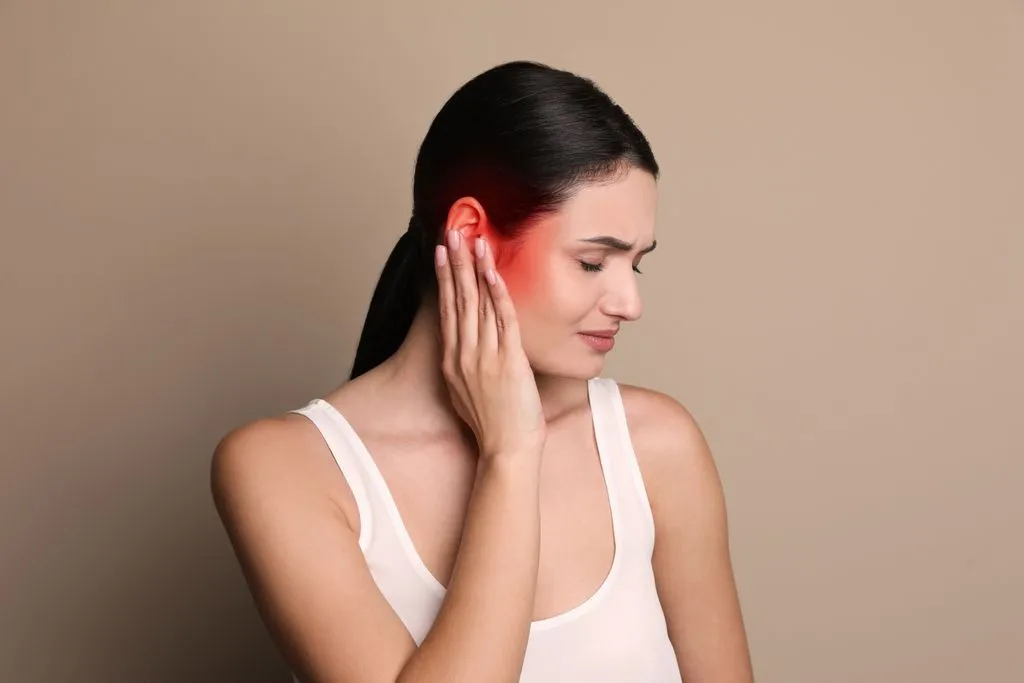Sharp Ear Pain: What Could Be the Cause?
8 Common Reasons Why Ears Hurt
1. Sinus Infections
Ear pain is one of the many symptoms that sinus infections are known to cause. The sinuses and ears are interconnected, and inflammation in one area can easily affect the other. Prompt management of sinus infections is crucial to alleviate ear pain and prevent further complications.
2. Otitis
Viral or bacterial infections can cause otitis (inflammation of the ear). The discomfort can be sharp and may require medical attention for effective treatment. Identifying the type of otitis is essential to customize the right treatments.
3. Foreign Objects in the Ear
A foreign object stuck in the ear canal may cause sudden, intense pain. Things such as insects, debris, or excessive earwax have the potential to cause discomfort and even harm to the sensitive structures of the ear.
4. Temporomandibular Disorder (TMD)
The jaw joint may be impacted by temporomandibular disorder (TMD), which causes pain that travels to the ears. People with TMD can have jaw pain and an acute earache because facial structures are highly intertwined.
5. Earwax Buildup
Even though earwax is necessary for healthy ears, too much accumulation may cause significant ear pain. Effective cleaning methods and, if required, medical assistance can help control discomfort caused by earwax and avert other problems.
6. Tinnitus
Tinnitus, a condition characterized by ringing, buzzing, or hissing ear sounds, may sometimes coexist with ear pain, though the tinnitus itself does not cause the pain.. Improvements in ear health and relief from related discomfort can be achieved by understanding the causes of this condition and undergoing tinnitus treatment.
7. Air Pressure Issues
Sharp pain and discomfort in the ears may result from changes in air pressure. This often happens when scuba diving or flying. In some instances, yawning or swallowing can help equalize pressure and avoid an earache.
8. Swimmer’s Ear (Otitis Externa)
Sharp pain is a common symptom of a swimmer’s ear, an ear canal infection caused by water retention that allows bacteria/fungi to grow. Preventive steps like keeping the ears dry can help avoid this uncomfortable illness, particularly for individuals who frequently participate in aquatic activities.
Tips on Preventing Ear Pain
Certain indicators of ear pain require immediate medical attention, even if some symptoms go away independently or with easy home cures.
- Red Flags to Look Out for: Keep an eye out for any indications of leakage from the ear and continuing or worsening ear pain. These may be symptoms of deeper problems that need to be evaluated by a specialist.
- Watch for Changes in Hearing: It’s critical to get medical help immediately if you suffer an abrupt loss of hearing or observe a noticeable decline in your hearing ability. Numerous ear-related conditions can be linked to hearing impairment.
- Pay Attention to Associated Symptoms: Be mindful of any accompanying symptoms, such as fever or lightheadedness. These signs may offer crucial hints that help medical specialists diagnose the condition.
- Avoid Self-Diagnosis: Although home remedies may relieve some ear discomfort, it is essential to avoid self-diagnosing or self-treating severe or chronic problems. Seeking advice from a medical expert guarantees a precise diagnosis and suitable care.
- Make Immediate Care a Priority: If you notice any of these warning signs, it is best to seek medical attention. Prompt action can avert possible difficulties and aid in efficiently handling ear-related problems.
Common Treatments for Ear Pain
Pain Relievers
Over-the-counter pain relievers, such as acetaminophen or ibuprofen, are commonly used to manage ear discomfort, especially when symptoms escalate to severe pain. These medications help reduce inflammation and provide temporary relief while the underlying cause is being addressed. However, persistent or worsening symptoms should be evaluated by a healthcare provider to rule out more serious conditions.
Warm Compresses
Applying a warm compress to the ear can be an effective way to relieve pain, especially when the discomfort is due to inflammation or infection of the outer ear structures. The heat helps improve circulation, reduce swelling, and ease muscle tension in nearby areas like the jaw, providing soothing relief without medication.
Over-the-Counter Ear Drops
Over-the-counter ear drops are often used to ease pain and inflammation in the affected ear. These drops can contain ingredients to numb the area, soften wax, or fight minor infections. They are most helpful when the ear canal is not blocked or perforated. It’s essential to follow the directions carefully and consult a doctor if symptoms persist.
Decongestants and Antihistamines
Medications like decongestants and antihistamines are often recommended when ear pain stems from sinus pressure or Eustachian tube dysfunction. These medications help reduce swelling and promote airflow. This can relieve the feeling of fullness or pressure in the ears and prevent related discomfort.
Antibiotics
A doctor may prescribe antibiotics when ear pain is caused by a bacterial infection (often connected to an upper respiratory infection). These medications help prevent ear infections from spreading and are especially important in cases of chronic otitis media. It’s important to note that antibiotics are ineffective against a viral infection, so a proper diagnosis is essential before starting treatment.
Earwax Removal
Professional removal may be necessary when a buildup of earwax causes pain, blockage in one or both ears, or trouble hearing. While some people attempt home remedies, it’s best to avoid inserting objects into the ear, as this can push the wax deeper or damage the ear canal. A doctor can use irrigation or special tools to clear the blockage safely.
Rest and Hydration
Simple home care plays a vital role in easing ear pain. Staying well-hydrated helps thin mucus and support the body’s healing process, especially when congestion is involved. Adequate rest gives the immune system time to respond effectively. Avoid using cotton swabs, which can cause irritation or further blockage. For those experiencing muffled hearing, gentle activities like swallowing or using chewing gum may help equalize ear pressure.
Surgical Interventions
In complex or recurring cases, surgical interventions may be necessary. For example, chronic ear pain linked to the temporomandibular joint or teeth grinding may be addressed through dental or surgical correction to reduce pain. Infections that do not respond to antibiotics may also require surgical drainage or repair. Timely diagnosis and prompt treatment are crucial to avoid long-term complications, such as serious infections.
Texas Sinus & Snoring Is a Premier Destination for Treating Ear Pain
Understanding the many causes of acute ear discomfort is essential to treat and avoid it effectively. By learning about typical triggers and implementing proactive ear care practices, people can protect their ear health and promptly seek medical help when necessary. Texas Sinus & Snoring is a reliable partner for individuals looking for complete care for ear-related problems. From diagnosing and treating sinus infections to providing tinnitus care in Houston, TX, our experienced professionals are dedicated to promoting ear health and overall well-being.
FAQs
What Are the Causes of Feeling Off Balance but Not Dizzy?
Feeling off balance without dizziness can be attributed to various factors, including inner ear issues, neurological conditions, or certain medications. A thorough examination by a healthcare professional is essential to determine the underlying cause.
What Are the Leading Causes of Tinnitus, and What Options Are Available for Treatment?
Tinnitus can result from various factors, including age-related hearing loss, exposure to loud noises, and certain medical conditions. Treatment options may include hearing aids, sound therapy, or specialized interventions.
Can Sinusitis Cause Ear Pain and Hearing Loss?
Yes, sinusitis can cause ear pain and, in some cases, hearing loss. The inflammation and congestion associated with sinusitis can affect the Eustachian tubes, leading to ear-related symptoms. Seeking timely treatment for sinusitis can prevent complications and preserve hearing health.
Can the Common Cold Cause Ear Pain?
Yes, the common cold can cause ear pain, especially when congestion leads to inflammation affecting the Eustachian tubes. These tubes help the ears naturally drain, but when blocked, pressure builds up and causes discomfort. A sore throat often accompanies these symptoms, further contributing to irritation in the surrounding areas.
Can Ear Pain Originate From Issues With the Eustachian Tubes?
Absolutely. Eustachian tube dysfunction can lead to middle-ear infections, pressure buildup, and acute otitis media. These issues may result in pain, muffled hearing, or even ear discharge. If untreated, they can cause serious complications, including long-term damage to ear structures.
Can Secondhand Smoke Cause Ear Pain?
Yes, exposure to secondhand smoke has been linked to increased risk of ear infections and pain, especially in children younger than five. Smoke irritates the respiratory tract and can impair Eustachian tube function, leading to fluid buildup and inflammation in the ear.
How Can I Schedule an Appointment at Texas Sinus & Snoring?
Scheduling an appointment at Texas Sinus & Snoring is convenient and accessible. Fill out a short form on our website or contact our office directly to book an appointment and take the first step towards better ear health.
What Services Does Texas Sinus & Snoring Offer?
Texas Sinus & Snoring offers comprehensive services to address sinus conditions, snoring issues, and ear-related problems. Our holistic approach caters to diverse ear health needs, from medical interventions to alternative treatments.
How Do We Diagnose Common Symptoms of Ear Infection?
Diagnosis involves evaluating the patient’s clinical manifestations, such as fever, ear pain, and irritability, alongside examining the ear. Doctors consider the patient’s health condition and medical history, particularly if ear tubes are present. A diagnosis is often made based on the following symptoms: ear redness, swelling, fluid behind the eardrum, and reduced hearing.




